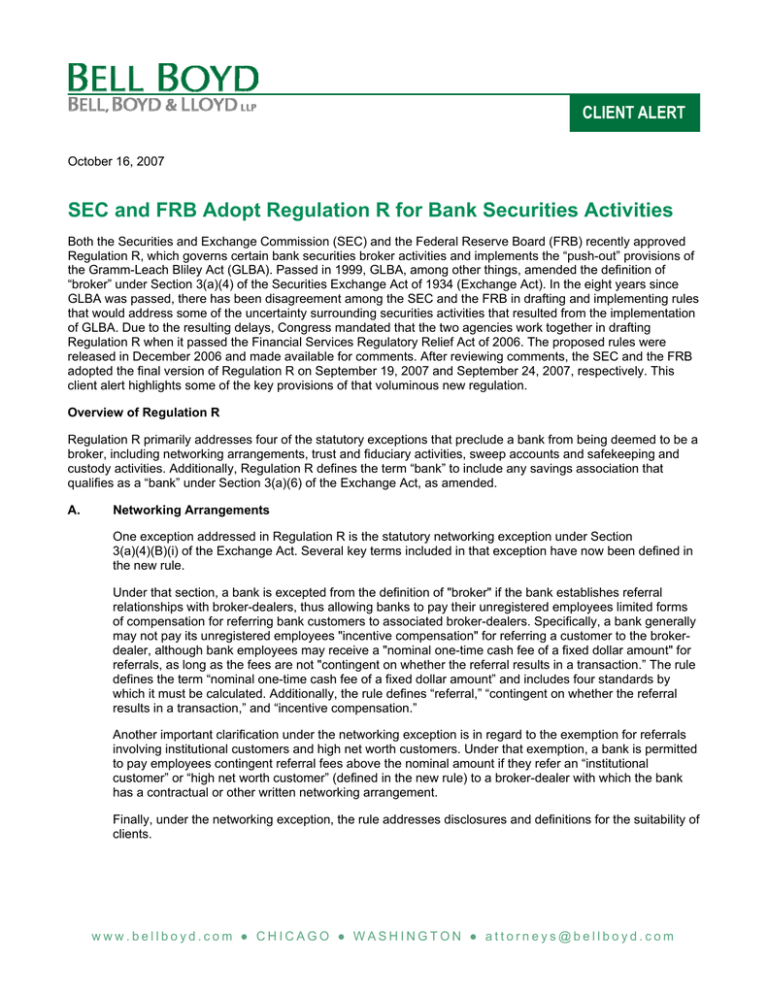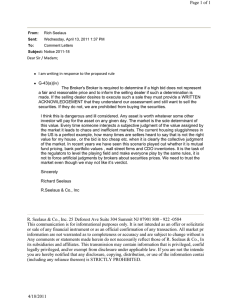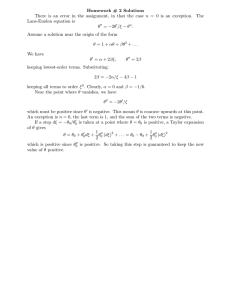
October 16, 2007
SEC and FRB Adopt Regulation R for Bank Securities Activities
Both the Securities and Exchange Commission (SEC) and the Federal Reserve Board (FRB) recently approved
Regulation R, which governs certain bank securities broker activities and implements the “push-out” provisions of
the Gramm-Leach Bliley Act (GLBA). Passed in 1999, GLBA, among other things, amended the definition of
“broker” under Section 3(a)(4) of the Securities Exchange Act of 1934 (Exchange Act). In the eight years since
GLBA was passed, there has been disagreement among the SEC and the FRB in drafting and implementing rules
that would address some of the uncertainty surrounding securities activities that resulted from the implementation
of GLBA. Due to the resulting delays, Congress mandated that the two agencies work together in drafting
Regulation R when it passed the Financial Services Regulatory Relief Act of 2006. The proposed rules were
released in December 2006 and made available for comments. After reviewing comments, the SEC and the FRB
adopted the final version of Regulation R on September 19, 2007 and September 24, 2007, respectively. This
client alert highlights some of the key provisions of that voluminous new regulation.
Overview of Regulation R
Regulation R primarily addresses four of the statutory exceptions that preclude a bank from being deemed to be a
broker, including networking arrangements, trust and fiduciary activities, sweep accounts and safekeeping and
custody activities. Additionally, Regulation R defines the term “bank” to include any savings association that
qualifies as a “bank” under Section 3(a)(6) of the Exchange Act, as amended.
A.
Networking Arrangements
One exception addressed in Regulation R is the statutory networking exception under Section
3(a)(4)(B)(i) of the Exchange Act. Several key terms included in that exception have now been defined in
the new rule.
Under that section, a bank is excepted from the definition of "broker" if the bank establishes referral
relationships with broker-dealers, thus allowing banks to pay their unregistered employees limited forms
of compensation for referring bank customers to associated broker-dealers. Specifically, a bank generally
may not pay its unregistered employees "incentive compensation" for referring a customer to the brokerdealer, although bank employees may receive a "nominal one-time cash fee of a fixed dollar amount" for
referrals, as long as the fees are not "contingent on whether the referral results in a transaction.” The rule
defines the term “nominal one-time cash fee of a fixed dollar amount” and includes four standards by
which it must be calculated. Additionally, the rule defines “referral,” “contingent on whether the referral
results in a transaction,” and “incentive compensation.”
Another important clarification under the networking exception is in regard to the exemption for referrals
involving institutional customers and high net worth customers. Under that exemption, a bank is permitted
to pay employees contingent referral fees above the nominal amount if they refer an “institutional
customer” or “high net worth customer” (defined in the new rule) to a broker-dealer with which the bank
has a contractual or other written networking arrangement.
Finally, under the networking exception, the rule addresses disclosures and definitions for the suitability of
clients.
www.bellboyd.com ● CHICAGO ● WASHINGTON ● attorneys@bellboyd.com
B.
Trust and Fiduciary Activities
Section 3(a)(4)(B)(ii) of the Exchange Act provides banks with an exception to effect securities
transactions in a trustee or fiduciary capacity without being registered as a broker, as long as certain
conditions are met. Included in this exception is the condition that a bank must be “chiefly compensated”
when effecting such transactions. The final rule addresses the definition of “chiefly compensated” and
how it can be assessed using the concept of “relationship compensation,” as explained in the release
proposing Regulation B.
C.
Sweep Accounts and Transactions in Money Market Funds
The “sweep exception” under rule 3(a)(4)(B)(v) of the Exchange Act excepts a bank from the definition of
“broker” to the extent “the bank effects transactions as part of a program for the investment or reinvestment of deposit funds into any no-load, open-end management investment company registered
under the Investment Company Act that holds itself out as a money market fund.” In an effort to provide
banks with guidance on that exception, the new rule defines several terms, such as “money market fund,”
as well as listing the qualifications for a class or series of securities of an investment company to be
considered “no-load.”
Additionally, a bank may effect transactions on behalf of a customer, or for the deposit funds of another
bank, in securities issued by a money market fund without registering as a broker, as long as certain
conditions are met. The purpose of this addition is to allow banks to provide sweep services to other
banks, as they are permitted to do under the sweep exception itself.
D.
Safekeeping and Custody
Under Section 3(a)(4)(B)(viii) of the Exchange Act, banks are excepted from the definition of “broker” so
long as they are performing one of five activities listed in the rule. Regulation R includes an exemption to
allow banks to accept orders for securities transactions from certain other persons, including employee
benefit plan accounts and individual retirement accounts for which the bank acts as custodian, provided
that certain conditions are met. The new rule also extends the custody exception to sub-custodians,
provided they cross bank custody customers’ securities transactions.
Compliance
As approved, Regulation R provides that banks must comply with the new rules and the “broker” exceptions in
Section 3(a)(4)(B) by the first day of their first fiscal year that commences after September 30, 2008. The full text
of the rule is available online at http://www.sec.gov/rules/final.shtml.
For further information, please contact Cameron Avery 312-807-4302, Kevin Bettsteller 312-807-4442, Paul
Dykstra 312-781-6029, Jennifer Esquibel 312-807-4262, Alan Goldberg 312-807-4227, Elizabeth Hudson 312-807-4376,
Anna Paglia 312-781-7163, Alicia Perla 312-807-4318, Andrew Pfau 312-807-4386, Paulita Pike 312-781-6027, Eric Purple
202-955-7081, Bruce Rosenblum 202-955-7087, Donald Weiss 312-807-4303, Gwendolyn Williamson 202-955-7059 or Stacy
Winick 202-955-7040 of Bell, Boyd & Lloyd’s Investment Management and Financial Markets Group or visit our Web site at
www.bellboyd.com.
This publication has been prepared by the Investment Management and Financial Markets Group of Bell, Boyd & Lloyd for
clients and friends of the firm and is for information only. It is not a substitute for legal advice or individual analysis of a
particular legal matter. Readers should not act without seeking professional legal counsel. Transmission and receipt of this
publication does not create an attorney-client relationship.
© 2007 Bell, Boyd & Lloyd LLP All Rights Reserved
www.bellboyd.com
Bell, Boyd & Lloyd LLP
70 West Madison Street
Chicago, Illinois 60602
t. 312-372-1121
f. 312-827-8000
Bell, Boyd & Lloyd LLP
1615 L Street, N.W.
Washington, D.C. 20036
t. 202-466-6300
f. 202-463-0678



